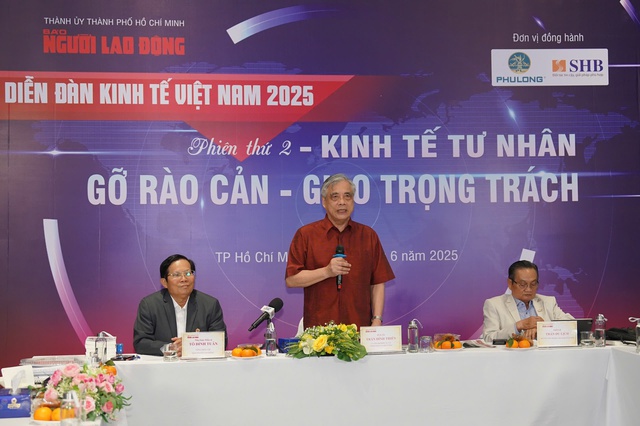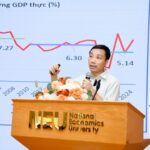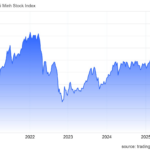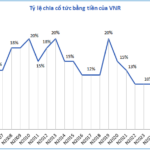Vietnam’s private sector is poised to become the most important driver of the country’s economic growth. Resolution 68 of the Political Bureau affirmed this, marking a significant shift in perception and development orientation. However, the question arises: does this sector have the capacity to shoulder such a grand mission, especially when the private sector is going through an unprecedented difficult period in over 40 years?
“The private sector has never been as weak and difficult as it is now in the last 40 years,” said Prof. Dr. Tran Dinh Thien, Member of the Prime Minister’s Policy Advisory Council, at the Vietnam Economic Forum 2025, themed “Private Sector: Removing Barriers – Assuming Responsibilities”. According to him, assigning a grand mission in the context of the current weak private sector poses a significant challenge, not only for the private sector but also for the entire Party and State.
“Red Carpet, Caltrops Below” – Reform Is Impossible If the Institution Remains Fragmented
Despite contributing over 50% to GDP, Vietnam’s private sector faces several constraints. This is mainly due to foreign-invested enterprises (contributing 22% to GDP), while domestic enterprises account for only 9-10%. Most of these are micro, small, and medium-sized enterprises with low competitiveness and limited connectivity in terms of capital, technology, and governance, hindering their ability to compete in an open economy with import-export turnover equivalent to GDP.
The import-export structure further highlights the disparity, with foreign-invested enterprises dominating and domestic enterprises declining. The ratio of dissolved enterprises is almost equal to the number of newly established ones, reflecting the business environment’s obstacles.
Given this situation, Prof. Dr. Thien believes that Resolution 68 is necessary and timely. Still, it will not be enough without a synchronized change in thinking and institutions.
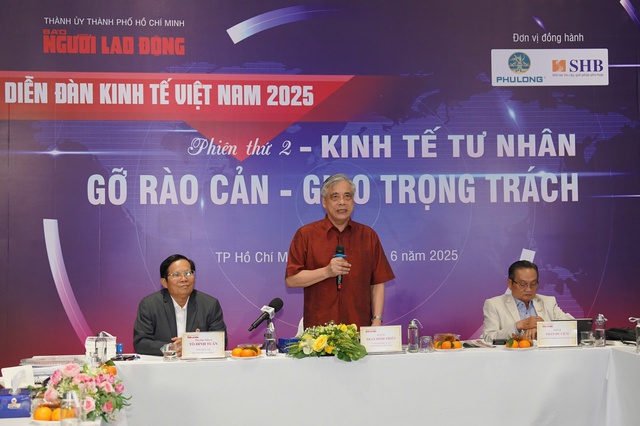
Prof. Dr. Tran Dinh Thien, Member of the Prime Minister’s Policy Advisory Council (Photo: Duy Phu)
Firstly, there is a need to change the policy mindset. If the private sector was once considered an “outside-the-system” force, it should now be recognized as “part of us” and a central force in the development strategy. The “if it can’t be managed, then ban it” mentality should end. Policies should not only regulate but also proactively create an environment conducive to business development.
Secondly, there is a need to improve institutions and the legal framework. The “please-give” mechanism from the bottom up has created risks for both enterprises and the implementing apparatus. Therefore, the reform mindset should come from the top down – clear, unified, and decisive. When the institutional foundation is smooth, policy implementation will avoid the “red carpet, caltrops below” situation.
Walk the Talk – Turning Commitments into Actions
Another notable point is that the ratio of enterprises withdrawing from the market is approaching the rate of newly established enterprises, indicating that the business environment still has many obstacles and lacks stability. To improve this situation, enterprises need easier access to essential resources such as land, finance, and skilled labor.
Prof. Dr. Thien emphasized the importance of implementing Resolution 68 in conjunction with other resolutions like 57, 59, and 66 to form a comprehensive strategic framework. Specifically, there is a need to establish a legal mechanism to protect pioneering entrepreneurs and reduce the risk of criminalization in pure business activities, thereby encouraging innovation.
Enterprises themselves also need to change their mindset, moving from “not wanting to grow” to adopting modern and transparent governance capable of integration and global competition.
Despite the challenges, Vietnam’s private sector holds immense potential to become the main growth driver. As Prof. Dr. Thien emphasized at the forum, close coordination between the State, enterprises, and society is crucial, embodying the spirit of “walking the talk and turning commitments into actions.” Reforming institutions, providing resources, and encouraging innovation will not only help the private sector take off but also contribute to Vietnam’s goal of becoming a high-middle-income country by 2030. With determined and synchronized steps, the private sector will not only be a hope but also the backbone of a prosperous and sustainable economy.
“Unleashing Institutional Reform: A Powerful Imperative.”
Introducing a seamless and efficient business experience: While businesses continue to navigate the complex landscape of administrative procedures, there has been a growing sentiment that these processes remain cumbersome and time-consuming. It’s time to revolutionize the way we work and unlock a world of streamlined efficiency.
“The Private Sector: Leading the Charge Towards a Low-Carbon, Green Growth Economy”
Although the nation’s economic growth model remains carbon-intensive, Vietnam’s private sector has begun to seize green growth opportunities. The private sector will also be pivotal in Vietnam’s efforts to reduce emissions and transition to a low-carbon economy.
What GDP Growth Rate Does Vietnam Need to Attain to Surpass a Per Capita GDP of $28,500 and Join the High-Income Country Group by 2045?
On June 3, the National University of Economics in collaboration with the Central Policy and Strategy Committee organized a policy dialogue seminar on the topic: “Orientation and Solutions for High and Sustainable Economic Growth towards 2045”. At the seminar, experts discussed growth scenarios and solutions for Vietnam to achieve its economic development goals.


























